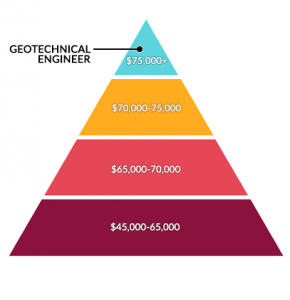The Best Strategy To Use For Geotheta
The Best Strategy To Use For Geotheta
Blog Article
A Biased View of Geotheta
Table of ContentsThe Geotheta DiariesFascination About GeothetaAll about GeothetaThe Ultimate Guide To GeothetaGeotheta for Dummies

They carry out website examinations, collect examples, do lab examinations, and assess data to examine the suitability of the ground for building jobs - Engineer of Record. Based on their searchings for, geotechnical engineers offer recommendations for structure design, slope security, preserving frameworks, and mitigation of geotechnical threats. They work together with various other professionals, such as engineers, structural designers, and building groups, to guarantee that geotechnical factors to consider are incorporated right into the total project style and implementation
By analyzing the behavior and residential properties of dirt and rock, they can identify possible geotechnical threats such as landslides, dirt settlement, or incline instability. Their competence helps protect against failings or mishaps that can endanger lives and property. Here are some thorough duties and duties of a geotechnical engineer: Website Examination: Geotechnical engineers conduct site examinations to gather information on subsurface problems.
They translate the information to comprehend the properties and behavior of the soil and rock, including their toughness, leaks in the structure, compaction characteristics, and groundwater problems. Geotechnical Evaluation and Design: Geotechnical designers assess the information collected throughout site examinations to examine the stability and viability of the site for construction projects. They execute geotechnical computations and modeling to examine aspects such as bearing capability, settlement, incline security, side earth stress, and groundwater circulation.
Some Of Geotheta
Structure Design: Geotechnical designers play a crucial function in designing structures that can safely support the designated framework. They assess the soil problems and load needs to figure out the proper foundation kind, such as superficial foundations (e.g., grounds), deep structures (e.g (https://old.bitchute.com/channel/GgOXLypkqwPa/)., stacks), or specialized techniques like dirt renovation. They take into consideration aspects such as settlement restrictions, bearing ability, and soil-structure interaction to develop ideal structure styles
They evaluate construction strategies, display site tasks, and conduct field examinations to verify that the design recommendations are adhered to. If unforeseen geotechnical problems occur, they evaluate the circumstance and give referrals for removal or modifications to the layout. Risk Analysis and Mitigation: Geotechnical designers analyze geotechnical threats and risks linked with the job website, such as landslides, liquefaction, or soil erosion.

Cooperation and Interaction: Geotechnical engineers function closely with various other specialists included in a project, such as designers, structural engineers, and building and construction groups. Reliable communication and collaboration are important to integrate geotechnical factors to consider into the general task layout and building process. Geotechnical engineers offer technological know-how, solution inquiries, and make sure that geotechnical requirements are satisfied.
Fascination About Geotheta
Here are some kinds of geotechnical designers: Foundation Engineer: Structure designers focus on making and examining foundations for frameworks. They assess the soil problems, lots demands, and site attributes to identify the most ideal structure kind and style, such as superficial foundations, deep foundations, or specialized techniques like heap foundations.
They examine the aspects affecting slope security, such as soil buildings, groundwater problems, and slope geometry, and establish techniques to avoid incline failings and mitigate risks. Earthquake Engineer: Quake designers specialize in evaluating and making frameworks to stand up to seismic pressures. They evaluate the seismic threat of a site, review soil liquefaction possibility, and develop seismic layout standards to make sure the safety and security and durability of frameworks throughout earthquakes.
They perform field screening, accumulate samples, and examine the accumulated data to define the soil homes, geologic developments, and groundwater problems at a site. Geotechnical Instrumentation Designer: Geotechnical instrumentation engineers concentrate on tracking and measuring the actions of dirt, rock, and frameworks. They set up and keep instrumentation systems that keep track of factors such as soil negotiation, groundwater degrees, incline motions, and structural displacements to assess performance and provide early warnings look these up of prospective issues.
The 15-Second Trick For Geotheta
They perform examinations such as triaxial examinations, consolidation examinations, direct shear tests, and permeability examinations to collect data for geotechnical analysis and layout. Geosynthetics Designer: Geosynthetics designers focus on the design and application of geosynthetic materials, such as geotextiles, geogrids, and geomembranes. They make use of these products to boost soil security, enhance slopes, provide water drainage services, and control erosion.
They have a tendency to be investigative individuals, which means they're intellectual, introspective, and curious. They are interested, methodical, rational, logical, and sensible. Some of them are additionally social, indicating they're kind, charitable, cooperative, client, caring, useful, empathetic, skillful, and friendly - Geotechnical Engineers.
In the workplace atmosphere, geotechnical engineers utilize specialized software devices to perform estimations, create designs, and assess information. They prepare records, testimonial task specifications, communicate with clients and employee, and coordinate job tasks. The workplace setup offers a conducive environment for research study, evaluation, and collaboration with various other experts involved in the project.
The Buzz on Geotheta
They frequently visit task sites to perform website investigations, evaluate geotechnical problems, and gather information for evaluation. These brows through involve taking a trip to different areas, occasionally in remote or challenging terrains. Geotechnical engineers might do dirt sampling, conduct examinations, and display building tasks to guarantee that the geotechnical aspects of the task are being implemented appropriately.
Geotechnical designers likewise operate in specialized geotechnical laboratories. In these facilities, they perform experiments, do examinations on soil and rock examples, and analyze the engineering residential properties of the products. Geotechnical laboratory engineers work thoroughly in these settings, managing screening devices, running instruments, and recording information. They team up with various other lab staff to guarantee precise and trustworthy testing outcomes.
Report this page